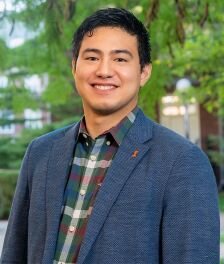Dr. Olivia Campos Coiado (she/her/ela)
Teaching Associate Professor & Director of Student Research, College Carle Illinois College of Medicine and Department Bioengineering
Dr. Coiado’s research interests include leadership, compassion, active-learning, education, innovative pedagogies, bioinstrumentation, and innovation. Her current project seeks to nurture creativity in healthcare innovation, whether through engineering-based invention or service redesign. Future developments of this project will be driven by her research and evaluation in two stages: 1) identifying opportunities of innovation in the social context of small groups and 2) developing of assessment tools (rubrics) about the efficacy of the creativity and leadership. The results of this project will serve as educational development for instructors and enhancement of innovation, creativity, and leadership skills for graduate students.



